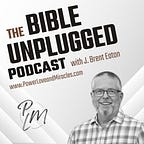Introduction
• What if a modern incarnation of the Tower of Babel story isn’t a place on a map, or a digital domain, but within our own hearts and souls? This tower isn’t built with bricks and mortar, or on the internet. This Babel is built on ambition, fear, the sacrifice of attention, and the desire for people to prove their self-worth.
• I’m Brent, and this is episode 50 of The Bible Unplugged. We conclude our 3-part series on the Tower of Babel story with a deep dive within the human soul. You may be building your own Tower of Babel without even realizing it.
• Please take a minute to look at the show notes for this episode at PowerLoveandMiracles.com under the Podcast tab.
The Background
• Let’s recap what we’ve talked about so far.
• In episode 48 we talked about the Tower of Babel story from Genesis 11 and looked at how unity for the wrong reason leads to a wrong result.
• In episode 49 we discussed how humanity replicates the Tower of Babel in every age.
• Now, we make of all this personal—how we make our own kingdoms of control within ourselves.
Make a Name for Ourselves
• In Genesis 11:4 the people said, “Let’s build ourselves a city, and a tower whose top reaches to the sky, and let’s make a name for ourselves.”
• Humans have a natural tendency to build things, whether physical structures or internal qualities. There is a natural drive to build a reputation, a platform, security, and approval. Babel isn’t simply a place; it’s a way of living.
The Bible and Human Ambition
• In Luke 12 Jesus shares a parable in response to a request to arbitrate a dispute between 2 brothers. In this parable, a rich man’s land produced an abundant crop. He thought it would be a good idea to tear down his small barns and build bigger ones to hold the large harvest. From his perspective this was ambitious and strategic. From God’s perspective the plan was worthless. When the man dies who will own his property and crops?
• The man planned a future based on his own self-interest without considering what God wanted him to do. The key verse in this story is verse 15 where Jesus said, “Beware! Keep yourselves from covetousness, for a man’s life doesn’t consist of the abundance of the things which he possesses.”
• From an eternal perspective, what we possess has no lasting value. But when we follow God’s lead, the things we own can be useful in God’s kingdom and be beneficial to us.
Modern Personal Towers
• In the Book of James chapter 4 we see an echo of this parable. In verse 14 James says, “You don’t know what your life will be like tomorrow.” We don’t know, but God does.
• We may not plan on building larger barns or harvest larger crops as the man in Jesus’ parable did, but there are situations in our lives that reflect the same sentiment.
• When your calendar is full of activity and requires you to keep up a frantic pace you may at the same time experience emptiness in your soul and dissatisfaction with your life.
• You may constantly work to gain approval from others instead of accepting that God already approves of you and loves you for who you are.
• You are making great plans for your future but don’t ask God to show you what your priorities should be.
What Do We Learn from This?
• In the Tower of Babel account, God interrupted the peoples’ plans in order to get their attention. God confused their language not to diminish their value but to affirm it. God interrupted their plans to rescue their soul. God does the same for us. What we see as a disappointment when our plans don’t work out may actually be God’s grace in disguise. A greater and more fulfilling future is waiting for us on the other side of our greatest disappointments.
• Jesus didn’t scold his followers for having strong ambitions, but he did redirect them:
• Peter went from being a fisherman in a boat to being a shepherd of God’s people.
• Mary Magdalene lived through trama, but her life became a great testimony to God’s power.
• Paul was a motivated persecutor who became a tireless preacher of the Gospel.
• We learn that God doesn’t cancel our motivation and abilities—He reassigns them to something greater.
• One thing we often learn the hard way is that the greater dependence we have on our own strength the more we fear failure. When we depend on God’s strength and direction, every experience becomes an opportunity for spiritual growth. Joy comes from knowing that God’s plans always direct us to a greater future.
What Do We Do with This?
• Take a discerning look at your life. Are there “inner Babel’s” you are building?
• What are you striving for that you haven’t surrendered to God’s leading?
• What do you fear when you consider your future?
• When you identify those tendencies, practice this prayer: “God, if I’m building something you didn’t want for me, tear it down gently.”
• What would life look like if you stopped using your own drive and energy to succeed and asked God to give you His divine direction and power? Ask God to teach you how to simply “be” in His presence and wait for His direction for your future.
• Most importantly, take time this week to ask yourself, “What brings me joy that doesn’t require me to wear myself out?” The answer could likely be the direction God wants for your life.
The conclusion
• And, yes, we have reached the end of this episode, but I’ll be back with a whole lot more later.
• I hope this has been helpful. If so, take a minute to give this podcast a high rating and share it with someone you know.
• In the next episode, we learn from the example of Ananias in the Book of Acts that obedience isn’t always comfortable, but it can lead to amazing results. God sent him to heal Saul, the man we know as the Apostle Paul who transformed the early church.
• My prayer for you is that your life would become a temple, not an earthly tower and that your life would be a place where heaven touches earth because God is leading and directing you.
• Have a blessed week.
The disclaimers
• Just to let you know
• All opinions are my own. If you agree, keep listening. If you don’t… keep listening, there’s got to be something new here for you.
• All Bible quotations come from the World English Bible which is a public domain work.
• Our show theme song is “Awesome Call” by Kevin MacLeod and is available under a Creative Commons license.
• The content of this podcast is copyrighted 2025 by J. Brent Eaton
• This has been a Power Love and Miracles production.










